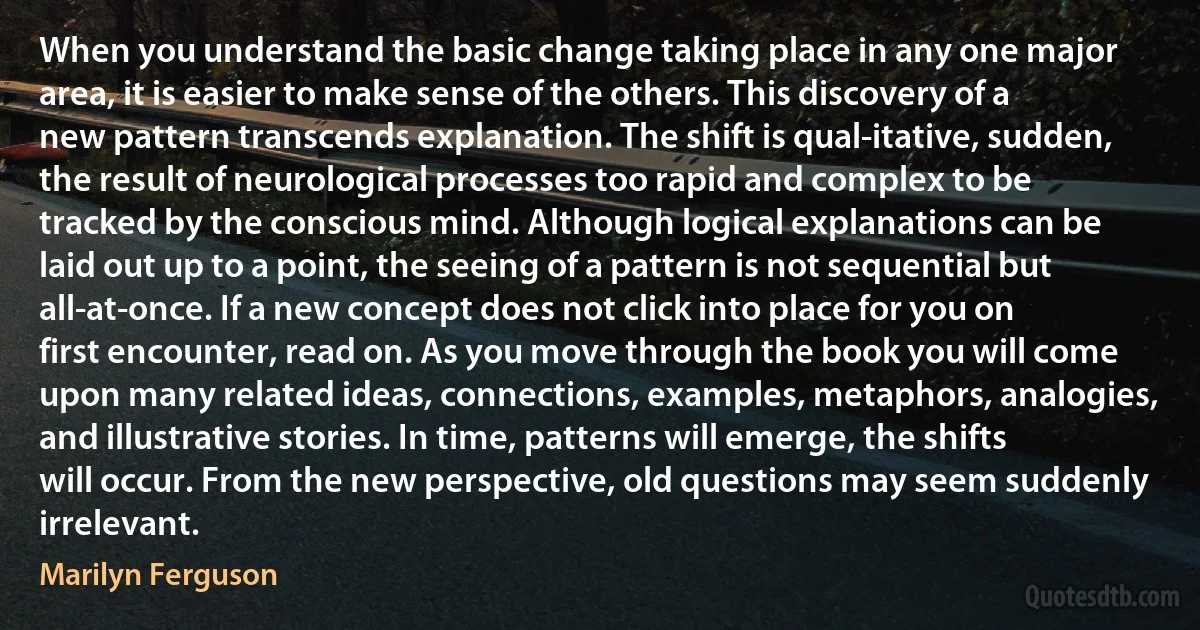
When you understand the basic change taking place in any one major area, it is easier to make sense of the others. This discovery of a new pattern transcends explanation. The shift is qual-itative, sudden, the result of neurological processes too rapid and complex to be tracked by the conscious mind. Although logical explanations can be laid out up to a point, the seeing of a pattern is not sequential but all-at-once. If a new concept does not click into place for you on first encounter, read on. As you move through the book you will come upon many related ideas, connections, examples, metaphors, analogies, and illustrative stories. In time, patterns will emerge, the shifts will occur. From the new perspective, old questions may seem suddenly irrelevant.
Marilyn FergusonRelated topics
basic book change complex concept easy emerge lay mind move place point rapid read result seeing sense sudden taking time others questionsRelated quotes
Our world model was built specifically to investigate five major trends of global concern – accelerating industrialization, rapid population growth, widespread malnutrition, depletion of nonrenewable resources, and a deteriorating environment. The model we have constructed is, like every model, imperfect, oversimplified, and unfinished... Our conclusions are : (1.) If the present growth trends in world population, industrialization, pollution, food production, and resource depletion continue unchanged, the limits to growth on this planet will be reached sometime within the next one hundred years. The most probable result will be a rather sudden and uncontrollable decline in both population and industrial capacity...

Eduard Pestel
Opticks was out of harmony with the ideas of 19th-century physics. ...an exposition of the "wrong" (i. e., corpuscular) theory of light,-even though it also contained many of the basic principles of the "correct" (i. e., wave) theory. Not only had Newton erred in his choice... but also he apparently had found no insuperable difficulty in simultaneously embracing features of two opposing theories. ...by adopting a combination of the two theories at once, he had violated one of the major canons of 19th-century physics... Today our point of view is influenced by the theory of photons and matter waves, or the... complementarity of Niels Bohr; and we may read with a new interest Newtons ideas on the interaction of light and matter or his explanation of the corpuscular and undulatory aspects of light.

I. Bernard Cohen
Sam Treiman... has quoted something he called Treiman's theorem... Impossible things usually don't happen. ...With the discovery of radioactivity... it suddenly became apparent that the "impossible" was happening all the time. Uranium, thorium, radium... fit all the requirements of chemical elements. They could not be broken down by any of the standard methods... But occasionally... atoms of these elements spontaneously changed into other kinds of atoms. ...So what is left of the doctrine of the elements? Is alchemy reinstated? Not at all. The point is that the doctrine fails only under rare or special conditions. ...We can isolate the conditions in which they do, and retain a more restricted but still useful concept of the "impossible."

Frank Wilczek
Living in a very dense area, you're conscious of how the people underneath live, and you have a certain feeling toward them – so much so that you'd rather live among them than with the business classes. In a historical sense, it might be related to an idea, but you write out of – well, I wouldn't call it indignation, but a kind of irritability that these people on top should be so contented, so absolutely unaware of these other people, and so sure that their values are the right ones. I mean, there's a certain satisfaction in recording the people underneath, whose values are as sound as theirs, and a lot funnier, and a lot truer in a way. There's a certain overall satisfaction in kind of scooping up a shovelful of these people and dumping them in somebody's parlor.

Nelson Algren
During the war the congregation was largely broken up [...] and it was never really reconstituted after the war. [...] Before the war my parents (I, too) had known almost every shop and shopkeeper in Cricklewood [...] and I would see them all in their places in shul. But all this was shattered with the impact of the war, and then with the rapid postwar social changes in our corner of London. I myself, traumatized at Braefield, had lost touch with, lost interest in, the religion of my childhood. I regret that I was to lose it as early and as abruptly as I did, and this feeling of sadness or nostalgia was strangely admixed with a raging atheism, a sort of fury with God for not existing, not taking care, not preventing the war, but allowing it, and all its horrors, to occur.

Oliver Sacks
